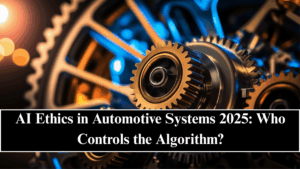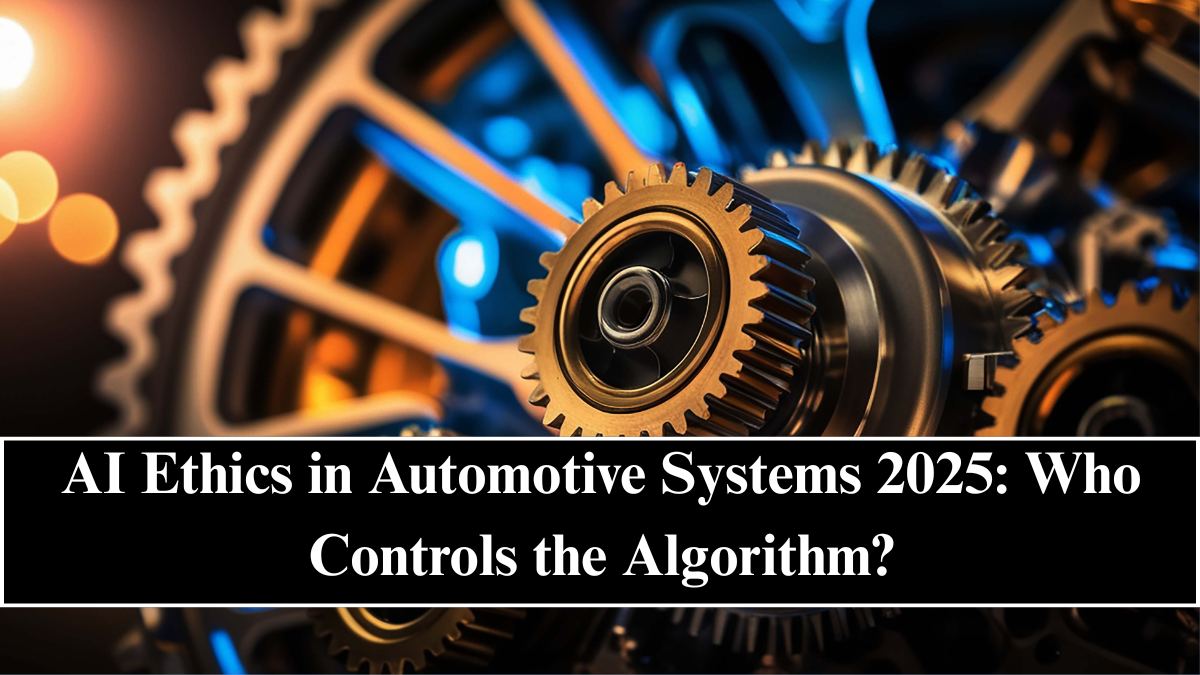As self-driving technology advances rapidly, the question is no longer whether cars can think — but how they should think. In 2025, the focus of innovation in the automotive world is not just on performance or autonomy but on AI ethics — the framework that governs how artificial intelligence makes life-and-death decisions on the road.
AI ethics in the automotive industry defines the rules, transparency, and accountability guiding autonomous vehicle (AV) behavior. It addresses questions like: who is responsible if a self-driving car causes harm? Should an algorithm prioritize passenger safety or pedestrian welfare? These dilemmas are now shaping both policy and design across the global automotive ecosystem.

The Moral Dilemma of Machine Decision-Making
AI-driven cars face ethical decisions that human drivers make instinctively. Imagine a car that must choose between hitting another vehicle or swerving into a wall — how should it decide?
This is known as the trolley problem of autonomous driving, and automakers are now working with ethicists, governments, and engineers to develop frameworks ensuring fair, transparent, and socially acceptable AI behavior.
Companies like Tesla, Waymo, Mercedes-Benz, and Volvo have invested heavily in defining algorithmic responsibility, ensuring vehicles act in line with human ethical values while minimizing harm.
The Role of Regulation and Global Standards
To prevent bias and ensure fairness, global bodies have stepped in. In 2025, major regulatory milestones include:
-
European Union’s AI Act: The world’s first law defining ethical and legal accountability for high-risk AI systems, including self-driving cars.
-
U.S. Federal Automated Vehicles Policy (FAVP): Sets ethical standards for AI training data, transparency, and decision logging.
-
Japan’s Road Safety and Ethics Protocol (RSEP): Requires AVs to explain their decisions post-incident using audit logs.
These frameworks compel automakers to record and disclose algorithmic behavior, ensuring AI is both explainable and compliant with human values.
Data Bias and Ethical Training Challenges
AI ethics go beyond decision-making — they also concern how algorithms are trained. If an AI system learns from biased or incomplete data, it may make flawed judgments on the road.
For example, an AI trained primarily on Western traffic conditions might fail to interpret Indian road behaviors accurately. To counter this, developers are now:
-
Using diverse global driving datasets for model training.
-
Running simulations of rare but critical scenarios, like unmarked crossings or unpredictable pedestrian movement.
-
Employing AI fairness auditing to ensure algorithms behave consistently across all demographics and environments.
This ensures that ethical driving decisions are not only intelligent but culturally and regionally fair.
Transparency and Accountability in Self-Driving Cars
AI ethics also demand transparency in how decisions are made. Automakers in 2025 are implementing “Explainable AI (XAI)” frameworks that log every major autonomous decision in real time.
For example:
-
If a collision avoidance system applies brakes suddenly, the reason — such as obstacle detection or trajectory prediction — is stored and accessible for review.
-
In case of accidents, decision logs help determine whether the car acted according to its ethical and technical parameters.
This transparency builds trust between users, regulators, and automakers, ensuring that AI-driven mobility remains both accountable and auditable.
Corporate Responsibility and Human Oversight
While AI systems now handle much of the decision-making, humans remain the ultimate authority. Most autonomous systems in 2025 still operate under Level 3 or Level 4 autonomy, where human oversight is mandatory in complex scenarios.
Leading manufacturers have established Ethical AI Boards to supervise how algorithms are designed, trained, and deployed. These boards include ethicists, engineers, and legal experts who review and validate every AI update.
In addition, companies are ensuring driver education programs accompany AV adoption — making sure users understand when and how to take control during emergencies.
The Future of AI Governance in Automobiles
Looking ahead, AI ethics in the automotive industry will evolve toward machine accountability and human-AI collaboration.
Key developments on the horizon include:
-
Ethics-based neural networks that can weigh moral outcomes dynamically.
-
Blockchain-based decision auditing to prevent tampering with AI logs.
-
Global ethical driving standards harmonized across continents for uniform safety norms.
As vehicles become smarter, ensuring they act within moral and legal boundaries will define public acceptance of autonomous technology. The goal is not just to build self-driving cars — but self-governing systems that act responsibly in every situation.
FAQs
What does AI ethics mean in automotive systems?
It refers to the moral, legal, and social guidelines that shape how artificial intelligence in vehicles makes decisions and interacts with humans.
Why is AI ethics important for self-driving cars?
Because AI decisions can impact lives, ensuring that these systems are fair, transparent, and accountable is essential for safety and public trust.
Who is responsible if an autonomous car causes an accident?
Responsibility is shared among the automaker, software provider, and system operator, depending on which component failed ethically or technically.
How do regulators ensure ethical AI in vehicles?
Through laws like the EU AI Act and FAVP, which require automakers to log, explain, and audit AI decision-making processes.
Will AI eventually make moral decisions independently?
Yes, future AI systems will have embedded ethical reasoning frameworks that dynamically weigh outcomes, though human oversight will remain crucial.
Click here to know more.
